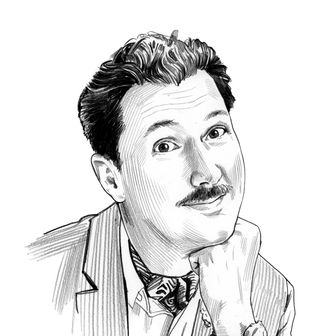
When I moved to London in May, I used to joke that it was just like New York but with weird money, but I quickly found out how naïve I was about my new home. I’d try to watch a “celebrity” edition of a game show on the “telly” and I wouldn’t recognize a single person. Something as simple as crossing the street became an exercise in terror whenever I forgot to look the right way. It’s all very confusing and alienating.
However, I have found one glorious cultural oasis: Love Island. This reality show, which just ended its fourth season and is available in the U.S. on Hulu, is something of a British obsession, regularly clocking around 4 million viewers in a nation of only 65 million. It has become a topic of national conversation tantamount only to Brexit, the World Cup, the royal wedding, and how unsufferably warm it is whenever it is hotter than 75 degrees (Fahrenheit, of course).
Love Island is closest in design to Bachelor in Paradise, or sort of like Big Brother if everyone was young, gorgeous, and hooking up all the time. The show starts off with six girls and seven guys, who are forced to pair up and share beds in a Spanish villa. Whenever somebody gets sent home, new boys and new girls are regularly added to the mix — sometimes in pairs, sometimes one at a time — which means there is always new drama. (Strangely enough, however, it rarely reaches Real Housewives levels of fighting.) At the end of two months, the last remaining couple goes home with a prize of a measly £50,000, or about $65,000.
Love Island is as educational as it is entertaining, so here are the eight most valuable things I’ve learned about the United Kingdom while watching it.
The UK watches TV differently
Love Island is on a shocking six nights a week! It airs a new episode every night, except Saturdays, when there is a recap episode of everything that happened during the week. There is also an after-show on Sundays following the usual episode, like The Talking Dead or Watch What Happens Live. This is apparently because the British are trained on watching prime-time soap operas like Coronation Street and EastEnders, which air multiple nights a week. This also explains the pace of Love Island, which is filmed and broadcast almost in real time, and where small movements in the coupling and uncoupling process are given considerable weight, much like they would on a classic soap opera.
British reality TV producers are cruel
The dumb, lovable idiots on Love Island are doing the same thing as American reality-TV stars: trading their anonymity and privacy for a shot to become famous on Instagram so that they can sell Flat Tummy Tea rather than ever having to get a real job. For that fame, they submit themselves to being psychologically tortured by especially mean reality-TV producers. The timing of new arrivals are completely random and arbitrary, as are the eliminations. Even the basis for an elimination is different each time. Sometimes whoever doesn’t have a partner gets kicked off. Sometimes the least popular couple gets voted off by viewers. Sometimes the contestants themselves get to choose who goes home, even if it breaks up a couple in good standing.
The best word to describe the way the show unfolds is “savage.” One couple, Georgia and Sam, were told that they could stay together and go home … or break up and stay in the villa but never “recouple” again. At one point, the producers tried to break up the leading couple, Jack and Dani, by bringing Jack’s ex onto the program and sending Dani misleading information about them. And when they’re not actively seeking to split people up, they’re subjecting the guys to lie-detector tests, reading the public’s mean tweets to the cast, or making them guess the results of polls ranking who is the most likely to cheat and which contestant doesn’t really “fancy” his or her partner. It’s so horrible, you won’t be able to tear your eyes away.
Same language, different language
We say that we speak English, but after one episode of Love Island, it was clear to me that we actually speak American. To “fancy” someone is to like them, or to “like like” them, as middle-schoolers would say. To “snog” is to kiss, but specifically a kiss with tongue. Someone who is attractive is “fit,” and if he or she is especially attractive, they are “proper fit.” When contestants have their “head turned” by someone “proper fit,” they will “crack on” with that person, which means to start flirting. They can also “graft” that person, which means to try to get them romantically interested. If that person leaves and screws them over, they are “mugged off” and if they are made to look like an asshole they are “turned into a mug.”
Accents matter
Obviously, all British people don’t sound like extras in Masterpiece Theater remakes of Charles Dickens novels, or like undecipherable flower girls at the beginning of My Fair Lady. But Love Island taught me there are countless gradations of accents, from the Scottish accent to the Essex accent (with significantly rounder vowels) or the Yorkshire accent (which sounds like putting English through a strainer). Much like American accents, these come with all sorts of judgments that I can’t even begin to understand. But at least I can recognize the differences now.
Trashy people live here, too
No, the British aren’t all stepping out of an episode of Downton Abbey and doing very sophisticated things in well-appointed rooms. Many of the Love Island contestants come from Essex, which is basically the New Jersey of the U.K., and their tastes wouldn’t be out of place in the Garden State. But they’re trashy in a very specifically British way. All of the clothes on the show are provided by a store unironically called MissGuided, which never met a crop top or a boob peephole it didn’t like. Also, Rosie, one of the mugged-off contestants, left the villa in a pair of see-through lace “trousers” that still haunt my nightmares.
If you still have any doubt that this show is full of trashy fools, just listen to this discussion about Brexit, where one of the contestants has no idea what it is and worries that it means all of the nation’s trees will be taken away.
Tighter the pants, straighter the man
The guys on Love Island wear pants that can be described as meggings. They are very flattering to the calves and large quads of the muscular dudes that populate this show, but they are always a little bit baggy in the back, as when a baby just got out of the pool in his diaper.
They’re just as racist as Americans
I like to joke that most of the cast isn’t white, they’re actually pink. That’s because several of the cast mates, especially Dr. Alex and Dani Dyer (whose father is a famous soap actor inexplicably also named Danny Dyer) always look like they spent a bit too much time in the sun. Meanwhile, though a number of black, brown, and mixed-race gentlemen have also been a part of the cast, only two women of color have spent significant time on the show: Kaz and Samira.
Samira is conventionally attractive, has a fun and winning personality, and made many friends in the villa, but none of the boys ever wanted to couple up with her (short of Dr. Alex, who was in a chaste “friend couple” with her while they bided their time waiting for new contestants). Then, when Samira finally found someone she fancied, he was voted one of the least popular guys and sent home, leaving her stranded in the villa alone and heartbroken yet again. She decided to leave of her own accord, convinced she wouldn’t find romance on the show. Clearly race was a subtext during this whole process, but it was never mentioned even once. I feel like this would have been a much bigger deal had it happened in the U.S.
Men and women are the same everywhere
Honestly, the most fascinating part of watching Love Island is seeing these relationships on fast-forward. Guys decide they’re not into their current mate and ditch her for something better. Girls question whether they should prioritize a man or their friendship with the other girls. The boys gossip to each other about how far they’ve gotten with their girls in the informal “Do Bits Society,” while the girls talk to each other about their insecurities. It’s a strange window not only into the way that men and women interact, but also the ways that sexes interact when they’re with each other. It’s a study of the rites of young adulthood and the intricate courting rituals that have only become more complicated with the availability of dating apps. It can teach us all a lot about British people but also about human beings in general, and it’s on six nights a week.
Oh, and didn’t I mention that it’s trashy? It’s really, really trashy.





